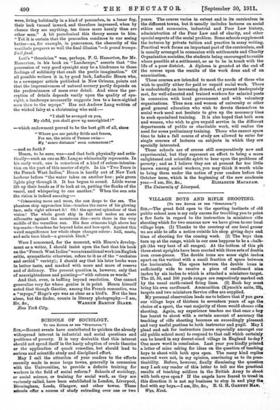SCHOOLS OF SOCIOLOGY.
To THE EDITOR Or THE "SEECTATOli."1 Sia,—Recent events have contributed to quicken the already widespread interest in industrial and social questions and problems of poverty. It is very desirable that this interest should not spend itself in the hasty adoption of crude theories or the application of quack remedies, but should lead to serious and scientific study and disciplined effort.
May I call the attention of your readers to the efforts recently made in some large towns, generally in connexion with the Universities, to provide a definite training for workers in the field of social reform ? Schools of sociology, or social science, or training for social work, as they are variously called, have been established in London, Liverpool, Birmingham, Leeds, Glasgow, and other towns. These ilehoola offer a course of study extending over one or two
years. The course varies in extent and in its curriculum in the different towns, but it usually includes lectures on social ethics and economics, industrial and Poor Law history, administration of the Poor Law and of charity, and other special aspects of the social problem. Some schools supplement the lectures by private tuition and practice in essay writing. Practical work forms an important part of the curriculum, and is usually arranged in connexion with settlements and Charity Organization societies, the students being encouraged to reside where possible at a settlement, so as to be in touch with the life of a poor district. A diploma is granted at the end of the course upon the results of the work done and of an examination.
These courses are intended to meet the needs of those who wish to qualify either for paid or unpaid social work. There is undoubtedly an increasing demand, at present inadequately met, for well-educated and trained workers for salaried posts in connexion with local government and with voluntary organizations. Thus men and women of university or other good general education who wish to devote themselves to social work need not hesitate to give np the necessary time to such specialized training. It is also hoped that both men and women, who wish to give unpaid service in the different departments of public or charitable work, will realize the need for some preliminary training. Those who cannot spare time to take a full course of study are allowed to enter for single courses of lectures on subjects in which they are specially interested.
These schools are of course still comparatively new and experimental, but they represent an effort to bring a more enlightened and scientific spirit to bear upon the problems of poverty ; and as I believe they are at present far too little known among social workers, you may think it worth while to bring them under the notice of your readers before the October term, which is the beginning of the new academie
year.—I am, Sir, &c., ELIZABETH MACADAM. The University of Liverpool.










































 Previous page
Previous page